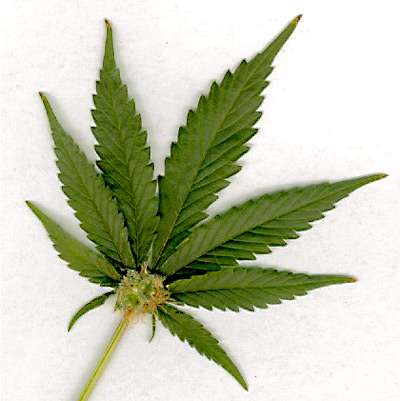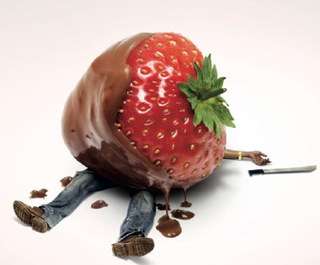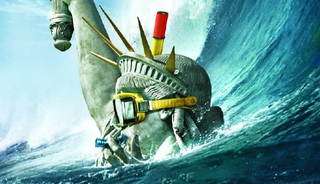Blogger friend Buck, along with many other folks I don’t respect quite as much, says Terrace Five should’ve been eliminated from the taxonomy of progressive levels of liberal anti-intellectualism and nastiness:
Morgan: We’re pretty much on the same page, now that you’ve submitted your clarifications. I pretty well know where you’re coming from anyway, based on past “discussions.” You’re entirely correct that drugs are another manifestation of The Culture Wars, and we can agree to disagree on that point. That said… I’d delete Item Five in your taxonomy were I you. It is NOT true in all cases, but I suppose that’s life, eh? There are always exceptions that prove the rule… but in this case I think the exceptions cut the OTHER way.
I can tell this is a good idea, because I already seriously mulled over it. The legalize-drugs brigade, contrary to my crude summary, is anything but atomic. There are several sub-factions within it, and although subdividing within an ideology may or may not be productive, you just can’t have it going on without someone thinking about something.
 However, the “should we legalize drugs” argument never fails to arouse great passion on both sides. For reasons that, I’m convinced, are wholly lacking in merit. It seems on the pro-legalize side, the emotion spews forth from a wellspring of feeling that a number of our current problems would disappear overnight if only the magic legalization were to take place. These troubles are associated with the criminal element; or, rather, with the criminal element being associated with a transaction that would be taking place regularly anyway, be it legal or not.
However, the “should we legalize drugs” argument never fails to arouse great passion on both sides. For reasons that, I’m convinced, are wholly lacking in merit. It seems on the pro-legalize side, the emotion spews forth from a wellspring of feeling that a number of our current problems would disappear overnight if only the magic legalization were to take place. These troubles are associated with the criminal element; or, rather, with the criminal element being associated with a transaction that would be taking place regularly anyway, be it legal or not.
There is some truth in this. But the notion that the problems would disappear, over a longer term or more instantaneous one, is entirely unsupported.
As I’ve said before, I see government-sanctioned, or government-sponsored, or government-permitted drug use as on the same level of government-managed lotteries. And the lotteries, in my world, rank high on the list of insidious evils. I blame the state-commissioned lotteries for the acceleration in Steve Allen’s Dumbth over the last quarter century.
The contradiction that weighs us down in these modern times, is that the prevailing mindset, lingering so long under the surface, and now bobbing up to the top in this Year of Obama, is that nothing is really worth anything. And yet, somehow, everything is worth yet another explosive expression of anger. Those greedy corporations. Those narrow-minded conservatives. Those irritating white males. Those dangerous gun nuts. Those, those, those, those, those. It is the anger of people who are passionate about freedom, without understanding what it really is.
This is why I would vote to keep marijuana illegal, if only someone would come asking for me to cast a vote. Marijuana makes people think like liberals. Suddenly, freedom is Orwellian. Freedom is freedom to smoke dope — and has little other meaning. If it’s legal to smoke dope, but you must do so in a shitty apartment surrounded with barbed wire, that you cannot leave, day or night, and surveillance cameras record your ever move even when you’re taking a dump…well then, you are “free” because you are allowed to get high.
Some other guy being allowed to raise his sons into real men, to fire a rifle in his backyard, to start a business and keep the profits, to use deadly force to defend his wife from being violated, to bellow at her to please get him a beer without being sent to sensitivity training — he isn’t “free” if the whacky terbacky isn’t lawful in his country, or in his part of it. Freedom, suddenly, is trashing your brain. Just as, in the case of the lotteries, “ambition” suddenly means a hope of matching up those six numbers. That and nothing more.
Those who care about nuthin’-but-legalization, I have confessed, are not that commonplace. Here and there, there are people who care passionately and wax lyrically about the soon-to-arrive magic legalization instant, and yet can form a number of well-thought-out positions on a variety of other issues. However, those who can run off the mouth about it, losing track of the importance of other, unrelated things — this is not quite so exclusive a club. And although I cannot prove it, it is my belief that this is errant thinking. My belief is that, if we were to legalize pot, or legalize drugs overall, things would not get better. I do not believe they would become catastrophic…but I do not believe things would stay the same, either. I think things would become slightly worse, the way things generally get worse nowadays. We’d lose something that is hard to notice, and just a few among us would notice the population is becoming overall dumbed-down yet some more. For this, we would be called kooks.
In other words, I think it would have exactly the same effect as the lotteries. The shift is a subtle one. In 1980, you said “I want to take my family on a nice vacation, so I’m going to work just a little bit harder.” By 2000, you said “I want to take my family on a nice vacation, so I hope those numbers line up.” See the little game? Work is regarded differently, and so life is regarded differently. That’s what would happen with drug legalization. We’d all start to look at life a little bit differently. That is the whole point actually using marijuana, is it not? To make you look at life a little bit differently? To make certain efforts look futile, that normally seem worthwhile when your mind is functioning the way it is supposed to?
The unholy triangle with which we are grappling, is between modern liberalism, drugs that take away the “Give-A-Fuck” instinct like marijuana…and…nihilism. New sidebar addition Self Evident Truths (hat tip, Gerard) expounds on the nihilist/liberal connection:
Here is the key to understanding modern liberals and their connection with nihilism. Modern liberalism bases ideals and programs on “a chaos of the instincts or passions.” Such ideals can only drift from one extreme to another as instincts and passions change over time. Hence, modern liberal politics is a politics of feeling, of self, of instinct, of passions with no understanding of the underlying roots of its own behavior, let alone of the nihilism which drives it.
The lack of understanding stems from liberal nihilism infiltrating into the university system. Once adopted, the university system rejected old values in favor of the new valueless system. In an amplifying feedback loop, the next generation of students came out of the universities not realizing that they lacked anything at all in their education. They didn’t even know enough to ask questions about what they might have missed.
There is a consequence to the adoption or acceptance of nihilism with no regard to US founding principles, morals, or religious constraints. Human nature always has a desire to some kind of foundation, some anchor from which to interpret life. By rejecting the foundational principles of the United States – Christianity, moral living, self-evident truths – the nihilist finds other ideologies to take their place – ideologies based on “a chaos of instincts and passions.”
One of the best known historians of religions, Mircea Eliade, had this to say in his seminal book, The Sacred and the Profane:
Nonreligious man has been formed by opposing his predecessor, by attempting to “empty” himself of all religion and all trans-human meaning. He recognizes himself in proportion as he “frees” and “purifies” himself from the “superstitions” of his ancestors….He cannot utterly abolish his past, since he is himself the product of his past (p. 204).
Those who give up religion, morals and foundational principles cannot free themselves from past principles because they are the products of the past and past experiences. Those who consider themselves “liberated” from the past can only respond to it, since without the past, they have absolutely no frame of reference.
Eliade gives this example of the attempt Marxists made to reject past values. Nihilists who buy into Marxism, Socialism, or Communism should note their dependance on Marx’s substitute religion:
We need only to refer to the mythological structure of communism and its eschatological content. Marx takes over and continues one of the great eschatological myths of the Asiatico-Mediterranean world – the redeeming role of the Just (the “chosen,” the “anointed,” the “innocent,” the “messenger”; in our day, the proletariat), whose sufferings are destined to change the ontological status of the world….Marx enriched this venerable myth by a whole Judaeo-Christian messianic ideology (p. 206).
What does this mean in real world terms? If we take, for example, a look at President Obama and his socially and fiscally liberal policies, we can see that most of his policies lack any definable reference to the foundational principles of the US. Instead, they adopt a Marxist version of a messianic ideology – the desire to create a pipe-dream world absolutely free from human problems. The government itself, just as Marxist doctrine taught, becomes the savior figure of the modern world. Obama becomes its chief prophet.
Those who have not adopted nihilism can immediately see the problems inherent in this system. The ideology leads from a false premise to a false conclusion. Government cannot be salvation, since, by its very nature, is composed of people who do not transcend the problems of the modern day.
Nihilists presume to a knowledge of reality, yet it is knowledge based on a faulty system and a false premise. As Bloom states:
However profound that knowledge may be, theirs is only one interpretation; and that we have only been told as much as [the nihilist founders] thought we needed to know. It is an urgent business for one who seeks self-awareness to think through the meaning of the intellectual dependency that has led us to such an impasse (p. 156).
Without understanding the nihilistic impulse, without understanding the philosophical roots of nihilism, without self-awareness of the lack of knowledge of other systems, the modern liberal has no chance of breaking free from the boundaries set for them by ideologues of the past.
And modern liberals will be at the mercy of today’s ideologues.
This, I fear, is what is to become more popular if legalization takes place. This is what concerns me when I call it a cultural issue. I still say it is immoral and contrary to the philosophies of the American experiment, for people in my location to dictate that people somewhere else should keep it illegal. On that subject, I’m more libertarian — let ’em get stoned outta their gourd, if that’s what they want to do. But on my own patch of ground, I’m voting no.
 The departure from reality people undertake, with marijuana, liberalism and nihilism, is quite profound. Two central themes seem to pop up from out of nowhere. The notion that nothing’s-worth-anything is a central pillar of the nihilism, of course. But then there are all these human rights. A human right to a job, to a house, to food, to a car, to the gas to put in it. Suddenly we’re all Han Solo; hokey religions are no substitute for a blaster at your side, kid. Nobody put us here. Nobody’s determining the outcome of cosmic events. But our skin becomes thinner, and all kinds of different forms of neglect, become violations of our human rights. Human rights. Nobody put us here, but humans have all these rights that other animals don’t have.
The departure from reality people undertake, with marijuana, liberalism and nihilism, is quite profound. Two central themes seem to pop up from out of nowhere. The notion that nothing’s-worth-anything is a central pillar of the nihilism, of course. But then there are all these human rights. A human right to a job, to a house, to food, to a car, to the gas to put in it. Suddenly we’re all Han Solo; hokey religions are no substitute for a blaster at your side, kid. Nobody put us here. Nobody’s determining the outcome of cosmic events. But our skin becomes thinner, and all kinds of different forms of neglect, become violations of our human rights. Human rights. Nobody put us here, but humans have all these rights that other animals don’t have.
That isn’t true of all people who smoke marijuana…bit it is true of most. And this shit stays in your system for a long time. Alcohol, on the other hand, is gone by the next morning. If it isn’t, then there will be a painful reminder to you to show some restraint next time. I keep hearing that marijuana and alcohol are on the same level, or should be. Sorry, I’m just not seeing it. Both can be abused. But with alcohol the abuse comes from excessive use. With marijuana the abuse comes from entering an entire thought culture that surrounds the drug. And the potential is there from the very first puff.
We have far too much dumbth already. We have far too much nihilism, with things the way they are. We don’t need more. And, the idea that there are lots of people who can’t talk about anything besides legalization once the subject comes up…not only remains a sensible recognition on my part, but a proven one. Proven by the very people who want to argue with me about it. I’ve written very few things that have attracted that much comment. And I’ve written nothing, I daresay, that’s attracted that much comment upon such a tiny, tiny subsection within it.
Update: Thanks to blogger friend Gerard, and his superior Google Image Search skills, for the image.












 This actually took place last month but I just found it. Entertainment columnist calls beauty contestant
This actually took place last month but I just found it. Entertainment columnist calls beauty contestant  Even good women have that “off-night.” You did this wrong. You did that wrong. You did some other damn silly thing wrong. I have a technique for dealing with that, too. “Sorry, dear, that’s the second thing you caught me doing wrong today.” “Sorry, that’s three things you found about what I did wrong today.” “Sorry, that’s four things I did wrong today.” By the time you get up to seven or eight, she’s wild about you.
Even good women have that “off-night.” You did this wrong. You did that wrong. You did some other damn silly thing wrong. I have a technique for dealing with that, too. “Sorry, dear, that’s the second thing you caught me doing wrong today.” “Sorry, that’s three things you found about what I did wrong today.” “Sorry, that’s four things I did wrong today.” By the time you get up to seven or eight, she’s wild about you.


 I always thought of her as fitting into the Big Three with perfection. Superman’s got godlike powers; Batman doesn’t have any at all; Wonder Woman’s just someplace in between. She gets into a fight in the middle of the city in midsummer, wearing her trademark bathing-suit-and-boots — it’s easy to think she’s human. The fight is taken into a frozen arctic tundra, now you have a subtle reminder that she’s a super being.
I always thought of her as fitting into the Big Three with perfection. Superman’s got godlike powers; Batman doesn’t have any at all; Wonder Woman’s just someplace in between. She gets into a fight in the middle of the city in midsummer, wearing her trademark bathing-suit-and-boots — it’s easy to think she’s human. The fight is taken into a frozen arctic tundra, now you have a subtle reminder that she’s a super being.
 However, the “should we legalize drugs” argument never fails to arouse great passion on both sides. For reasons that, I’m convinced, are wholly lacking in merit. It seems on the pro-legalize side, the emotion spews forth from a wellspring of feeling that a number of our current problems would disappear overnight if only the magic legalization were to take place. These troubles are associated with the criminal element; or, rather, with the criminal element being associated with a transaction that would be taking place regularly anyway, be it legal or not.
However, the “should we legalize drugs” argument never fails to arouse great passion on both sides. For reasons that, I’m convinced, are wholly lacking in merit. It seems on the pro-legalize side, the emotion spews forth from a wellspring of feeling that a number of our current problems would disappear overnight if only the magic legalization were to take place. These troubles are associated with the criminal element; or, rather, with the criminal element being associated with a transaction that would be taking place regularly anyway, be it legal or not. The departure from reality people undertake, with marijuana, liberalism and nihilism, is quite profound. Two central themes seem to pop up from out of nowhere. The notion that nothing’s-worth-anything is a central pillar of the nihilism, of course. But then there are all these human rights. A human right to a job, to a house, to food, to a car, to the gas to put in it. Suddenly we’re all Han Solo; hokey religions are no substitute for a blaster at your side, kid. Nobody put us here. Nobody’s determining the outcome of cosmic events. But our skin becomes thinner, and all kinds of different forms of neglect, become violations of our human rights. Human rights. Nobody put us here, but humans have all these rights that other animals don’t have.
The departure from reality people undertake, with marijuana, liberalism and nihilism, is quite profound. Two central themes seem to pop up from out of nowhere. The notion that nothing’s-worth-anything is a central pillar of the nihilism, of course. But then there are all these human rights. A human right to a job, to a house, to food, to a car, to the gas to put in it. Suddenly we’re all Han Solo; hokey religions are no substitute for a blaster at your side, kid. Nobody put us here. Nobody’s determining the outcome of cosmic events. But our skin becomes thinner, and all kinds of different forms of neglect, become violations of our human rights. Human rights. Nobody put us here, but humans have all these rights that other animals don’t have.